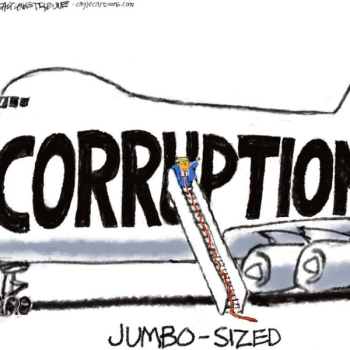Cross, Creation, and The Powers:
The Ecotheology of Sharon Delgado
Patheos PT 5006
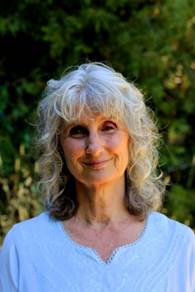
As we saw in Part One of “The Public Theology of Sharon Delgado,” this United Methodist pastor prays, preaches, marches, and makes noise that disturbs the powers of domination.
Here in Part Two, we’ll take a special interest in her brand new book of 2022, The Cross in the Midst of Creation. What I deem laudable about Sharon’s work in ecotheology is that she sees the ecological crisis systemically if not holistically in terms of planetary relations. Much more than merely global warming is at stake. Climate change belongs to a global system that includes economic, political, and cultural factors.
If you’ve been following this Patheos column on “Public Theology,” you’re likely aware of the series of posts in which I try to demonstrate the impact of the global economic system on planetary degradation. It’s my series on economism and the global common good.
Politics vs Common Good Governing Part One
Economism vs Common Good Part Two
Economism vs Common Good Part Three
Economism vs Common Good Part Four
Just, Sustainable, Participatory, and Planetary. Common Good Part Five
Public Theology for the Common Good
Ecotheologian Sharon Delgado has much more data, wisdom, and sound judgment on these matters than I have mustered. We’re now ready for the second segment of Sharon Delgado’s interview on public theology.
Question 5. I’m benefitting from reading your new book with Fortress, The Cross in the Midst of Creation. I really like the way you treat symbols. Here is a passage I’d like to ask you about.
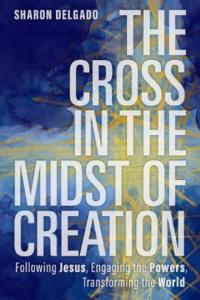
“The cross not only symbolizes the crucifixion and resurrection of Jesus that took place so long ago but also represents the same dynamic taking place here and now, throughout history and up to this present time. The Cross in the Midst of Creation asserts that it is God who suffers the cruel and heartless assaults that are being inflicted on creation, that God’s heart breaks as war is waged, as children are abused, as people in poor circumstances are deprived of their basic needs, as people of color are treated as if their lives don’t matter, as immigrants are mistreated, as people are imprisoned and forgotten, as the land is polluted, as species die, as the planet warms, as our young lose hope” (Delgado, The Cross in the Midst of Creation: Following Jesus, Engaging the Powers, Transforming the World, 2022, p. 3).
Sharon Delgado. The first sentence in this paragraph is a statement of the premise of the book. The rest of the paragraph claims that the crucifixion of Jesus, which happened long ago at a particular juncture of time and space, is also ongoing story as institutionalized powers very similar to those that crucified Jesus are at work today bringing suffering and death to people and the earth. It is an ongoing story about our struggle “not against enemies of blood and flesh, but against the rulers, against the authorities, against the cosmic powers of this present darkness, against the spiritual forces of evil in the heavenly places” (Eph 6:12).
But the ongoing nature of crucifixion is just the first half of the premise. To clarify, I must also include the paragraph that immediately follows, which refers to resurrection:
“At the same time, the resurrection is ongoing as people rise from despair and take courageous actions for the sake of the world. The spirit of the risen Christ lives in us as we come alive as fully human beings, living in resistance to the powers that would diminish us, creating life- giving alternatives, and persisting in the work of bringing peace, justice, and healing to the world. Following Jesus opens a way toward both personal and social transformation” (Delgado, The Cross in the Midst of Creation: Following Jesus, Engaging the Powers, Transforming the World, 2022, pp. 3-4).
“Even as the death- dealing powers continue their assaults on creation, Christ is risen and the Spirit is alive wherever compassion and justice reign: in peoples’ hearts, in social movements, in transformed people and societies. Living a resurrected life means joining in solidarity with all who seek justice, peace, and healing, especially those who are most vulnerable. Those of us who choose to bear the cross of Jesus must join with those who are already giving themselves to this sacred struggle for the new world that is possible. By courageously following Jesus, we participate in the ongoing resurrection through actions that reflect the love that brought us into being, the love that can’t be extinguished by any empire, the love at the heart of the universe” (Delgado, The Cross in the Midst of Creation: Following Jesus, Engaging the Powers, Transforming the World, 2022, p. 251).
Question 6. As a progressive Christian and ecotheologian, can you give those of us who live on Planet Earth any reason for hope?
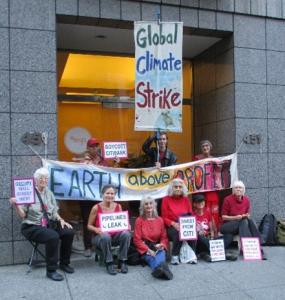
Sharon Delgado. My hope is based in the presence of the risen Christ, the tangible activity of the Holy Spirit, and the promise of resurrection. I also find hope in action, especially communal action, as people in social movements around the world are joining in solidarity to demand systemic change. “It is easy to become disheartened when we consider the extent of personal and social sin and the extremity of systemic evil… [but] there have been profound social transformations in recent years that demonstrate the possibility of the coming of a new consciousness, a new understanding of what it means to be human, and new ways of living that out” (Delgado, The Cross in the Midst of Creation: Following Jesus, Engaging the Powers, Transforming the World, 2022, p. 250).
These different sources of hope may sound contradictory, but they are not. For we are not called to be bystanders, but participants in God’s redemptive action in the world.
When we pray the Lord’s Prayer, asking for God’s kingdom to come and God’s will to be done on earth as it is in heaven, we acknowledge that the world as we know it now is not the world as God intends for it to be. By doing so, we orient ourselves in the direction of God’s intended world, as Jesus did. This implies hope that, in the secular words of the global justice movement, “another world is possible.” If we invest ourselves in this vision, we work to make it so. Through faithful action we embody hope. We live hope into existence.
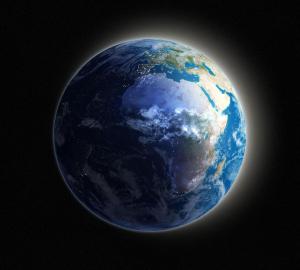
By our own strength alone, we are not able to change ourselves at a deep level or to bring about the systemic transformation that is needed, but the Spirit empowers us to practice the faithfulness of Jesus, to resist the powers and their deadly effects, and to pray and work to create communities that demonstrate the reign of God in our midst. In these ways, we bring hope to seemingly hopeless situations and begin to see signs of resurrection all around. In Greta Thunberg’s words, “Once we start to act, hope is everywhere.”
Conclusion
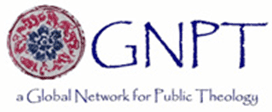
Thank you, Sharon.
The value of public theology to the global conversation comes in the form of discourse clarification and worldview construction. By analyzing public discourse to make its presuppositions transparent, the critical theologian can expose the vested interests that block the road toward Earth justice. By appealing to Christian symbols such as the cross or the creation, the constructive theologian can construct a meaningful worldview within which our human efforts to enhance both human and natural flourishing make sense to people. This is ecotheologian Sharon Delgado’s mission.
▓
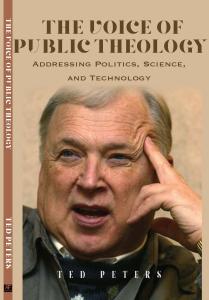
Ted Peters pursues Public Theology at the intersection of science, religion, ethics, and public policy. Peters is an emeritus professor at the Graduate Theological Union, where he co-edits the journal, Theology and Science, on behalf of the Center for Theology and the Natural Sciences, in Berkeley, California, USA. His book, God in Cosmic History, traces the rise of the Axial religions 2500 years ago. He previously authored Playing God? Genetic Determinism and Human Freedom? (Routledge, 2nd ed., 2002) as well as Science, Theology, and Ethics (Ashgate 2003). He is editor of AI and IA: Utopia or Extinction? (ATF 2019). Along with Arvin Gouw and Brian Patrick Green, he co-edited the new book, Religious Transhumanism and Its Critics hot off the press (Roman and Littlefield/Lexington, 2022). Ted has just published The Voice of Public Theology (ATF 2022). See his website: TedsTimelyTake.com.
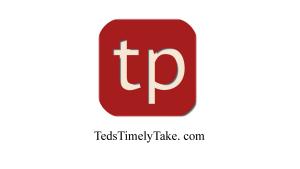 This fictional spy thriller, Cyrus Twelve, follows the twists and turns of a transhumanist plot.
This fictional spy thriller, Cyrus Twelve, follows the twists and turns of a transhumanist plot.
▓
References
Cone, J. (2013). The Cross and the Lynching Tree. Maryknoll NY: Orbis.
Delgado, S. (2007). Shaking the Gates of Hell: Faith-Led Resistance to Corporate Globalization. Minneapolis MN: : Fortress.
Delgado, S. (2022). The Cross in the Midst of Creation: Following Jesus, Engaging the Powers, Transforming the World. Minneapolis MN: Fortress.
Peters, T. (2021). Public Theology, Discourse Clarification, and Worldview Construction. Theology and Science 19:1, 1-4; DOI.org/10.1080/14746700.2020.1869672 .
Stringfellow, W. (1973). An Ethic for Christians and Other Aliens in a Strange Land. Waco TX: Word.
Wesley, J. (n.d.). Sermon 23: 3rd Discourse on the Sermon on the Mount. http://wesley.nnu.edu/john-wesley/the-sermons-of-john-wesley-1872-edition/sermon-23-upon-our-lords-sermon-on-the-mount-discourse-three.
Wink, W. (1992). Engaging the Powers. Minneapolis MN: Fortress.







